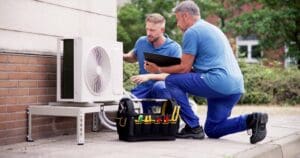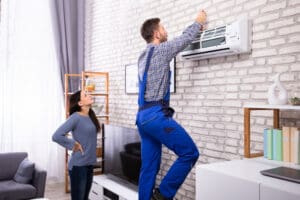Unlocking the Mystery: How Long Do Air Conditioners Really Last?
As a home or property owner in St. Louis, MO, you may want to know how long you can expect your air conditioner to last and when it’s time to get a replacement. At Classic Air Care, we’re here to help guide you through the factors that influence your air conditioner’s lifespan, ways to prolong it, and when to consider a replacement over repairs.
Have an Old AC Unit? Call Us Today
Factors Influencing the Lifespan of Air Conditioners
When you’re investing in an air conditioner for your home in St. Louis, you’re going to want to get the most out of it. Central air conditioners make Missouri’s hot and humid summers much easier to handle, especially on those days when the temperatures soar above 100 degrees. An old or unmaintained AC unit may become overwhelmed on the hottest days, leading to insufficient cooling or breakdowns. Understanding the lifespan of these essential appliances is crucial for budgeting, maintenance planning, and making informed purchasing decisions.
Here are some factors that influence the lifespan of your air conditioner:
Quality of Installation
The quality of how your air conditioner was first installed will determine how well it runs. A poorly installed AC unit may cause inadequate airflow, refrigerant leaks, and electrical problems. These issues compromise the system’s efficiency and accelerate the wear and tear, ultimately shortening its lifespan.
Maintenance Practices

Regular maintenance for your AC unit ensures optimal performance and a long lifespan. There are some at-home maintenance you can do, such as changing out and cleaning your air filters. You can also hire professional maintenance and AC tune-up services, where professionals will inspect and repair any issues that you may not recognize. With routine maintenance practices, you’re able to improve your unit’s overall performance, saving you money on energy bills and repair costs in the long run.
Usage Patterns
The frequency or rate at which you use your air conditioner will determine how long it lasts—living in St. Louis, Missouri, residents use their air conditioners for the majority of the summer. With proper upkeep, your unit should last you 10-15 years, but overworking it by setting it to super low temperatures or keeping it constantly running can strain its components and lead to premature failure. Implementing energy-saving practices, such as using programmable thermostats and maintaining moderate indoor temperatures, can help prolong the life of your air conditioner.
Environmental Factors
The climate, location, and exposure to environmental elements such as sunlight and debris will have an effect on your AC’s durability and lifespan, especially in the hot and muggy climates of Missouri. It’s important to install your AC unit in an area where it will be the least affected by rain, storms, sunlight, pests, and other damaging environmental factors.
Signs That You May Need a New Air Conditioner
If your air conditioner is reaching the end of its lifespan and you’re looking for a replacement, you might’ve noticed some of these signs that you need a new air conditioner:
Decreased Cooling Efficiency
If your AC unit isn’t cooling down your house within minutes, or is cooling inconsistently, then you know you have a problem. Issues such as clogged ducts, refrigerant leaks, or malfunctioning components can all contribute to decreased cooling performance.
Increased Energy Bills
A sudden spike in your energy bills can be a cause for concern, especially if there haven’t been any significant changes in your household’s energy consumption habits. As air conditioners age, they tend to become less energy efficient, requiring more power to deliver the same level of cooling comfort. Investing in a newer, more energy-efficient model can not only lower your monthly bills but also reduce your carbon footprint.
Frequent Repairs

If you find yourself constantly scheduling repairs to address recurring problems, consider a replacement. You could end up spending more on repairs in the long run, only to keep an outdated and energy-hungry unit.
Unusual Noise or Odors
Your HVAC unit usually makes a soft hum when you turn it on, and shouldn’t put out any smells. However, if you do notice smoke-like smells or any strange noises, it could be a sign of the unit’s internal components deteriorating. The best thing to do in this situation is to turn off your HVAC or AC unit and call a professional right away to inspect your situation before any further damage.
Drawbacks of Using an Old Air Conditioner
If you’ve noticed one or more of the signs above, but you’re still not ready to part with your old air conditioner, consider these drawbacks:
Reduced Efficiency And Performance
Old AC units may struggle to maintain desired temperatures—natural wear and tear will break down your unit and repairs won’t be able to increase its performance.
Higher Energy Bills
Old air conditioning systems aren’t made with the same technology these days, and they use significantly more energy. This increased energy consumption with older, less efficient units causes higher energy bills.
Risk of Breakdowns
With an old unit’s worn-out components, the risk of potential system failures considerably increases.
Poor Air Quality
Air conditioners produced before 2010 often utilized R22, an outdated refrigerant known for its harmful effects on the ozone layer. Recognizing its environmental impact, the EPA has since banned the use of R22 in new AC systems.
How To Extend the Lifespan of Your Air Conditioner
Get the most out of your AC unit and prolong its lifespan by performing routine cleanings and scheduling quarterly maintenance services. Keep your air conditioner in tip-top condition with:
Regular Maintenance
Scheduling routine inspections, cleaning, tune-ups, and regular maintenance ensures that your air conditioner is professionally up to code and working efficiently.
Proper Usage Habits
Setting optimal temperatures and using programmable thermostats makes it so that your air conditioner doesn’t work so hard.
Timely Repairs
Addressing air conditioning issues promptly will prevent further damage, so it’s important to call a professional right away when something goes wrong.
Knowing When You Need Replacement or Repair
You may have noticed some signs that indicate the need for a new air conditioner, but that’s not always the case. If your AC unit isn’t that old and is making strange noises or running up your electricity bill, you could just need a repair. Here are some differences between whether or not you would need a replacement or repair service.
SIGNS OF REPAIR
Indications that your AC may need repair rather than replacement:
Budget Constraints: Replacing and installing a new air conditioner is an investment that many people can’t afford right away. On the flip side, a repair may cost so much that it may make more sense to save for a replacement.
Poor Air Quality: if your home has poor air quality and flow, then your unit will most likely benefit from repair service. Our professionals will replace all filters and thoroughly clean the air conditioner components and the home’s ductwork.
SIGNS OF REPLACEMENT
The indicators that it’s time to consider investing in a new AC unit:
The Age of The Unit: if your unit is reaching the ten-year mark, it’s probably time to consider and invest in a replacement.
Replacing Insulation: if you’re already making moves to upgrade your home insulation, it’s also a great time to replace your AC unit. A well-insulated home paired with an efficient air conditioner makes for the best cooling and energy savings possible.
Aging Heating System: If your heater, furnace, or heat pump needs to be replaced, you can often strike a good deal with a company that’ll give you a discount on both a heating and cooling system.
Air Conditioning Repair and Replacement in St Louis, MO
If you require HVAC or AC repairs, replacements, or maintenance services in St. Louis, MO, call Classic Aire Care. We’re proud to be your trusted team providing same-day and 24/7 emergency services to keep you cool and comfortable when you need it most.
Contact Us Today at 314-530-0578 for an Appointment
let’s get started
Let's Get Started


Save on Service & Enjoy Peace of Mind
Become a Planned Maintenance Agreement Customer
- Priority customer status
- Discounts on repair services
- Comprehensive maintenance & tune-ups
- No overtime charges
- Extended equipment life






